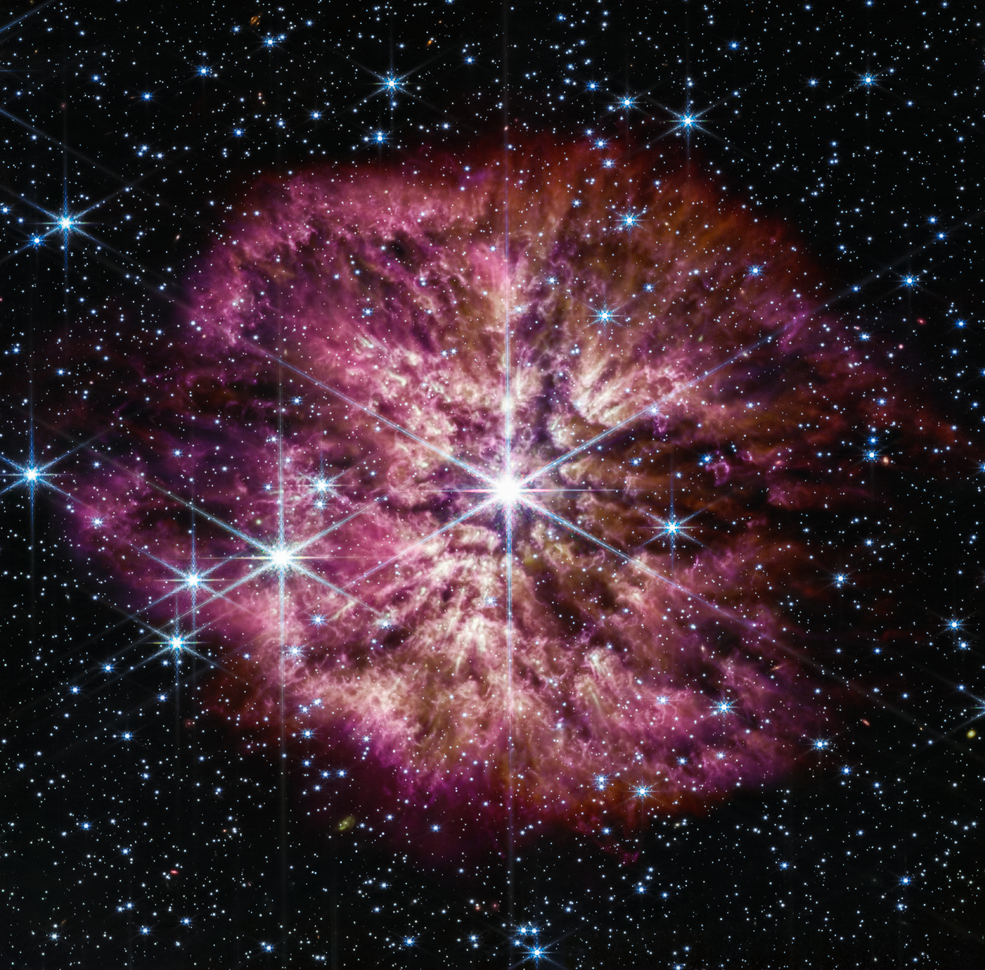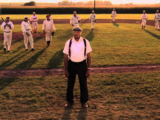
The hot star Wolf-Rayet 124, captured by the James Webb Space Telescope during a brief period in its life cycle before becoming a supernova. Our sun won’t become a supernova, but it will begin to die in about 5 billion years: NASA
The Big Picture –
By Glynn Wilson –
WASHINGTON, D.C. — I don’t know about you, but deep math problems have never seemed so fun to me. They burn too much energy.
Energy that could be utilized doing something much more fun, like playing baseball or the drums.
Some of the smartest people I know of revel in these math problems.
If you want to see a few of them at work, check out this trailer for the film A Trip to Infinity on YouTube, where eminent mathematicians, particle physicists and cosmologists dive into the subject of infinity, in the context of thinking about its mind-bending implications for the universe.
.I watched this awhile back on Netflix, and managed to get through it.
For me it was more fun to read an interesting take about it in the New York Times from staff science writer Dennis Overbye.
Who Will Have the Last Word on the Universe?
Not that our views on the subject are in 100 percent agreement. In fact, I think his description of the end of the universe — as understood by the latest science — lacks a key analogy or two that could be mined to popularize the story with more of the people, that is to say the masses. That is to say if they could be reached in this trifurcated world. Certainly no guarantee.
The way the end is described brought to mind the last great painting withering into decay, like Mona Lisa’s face crumbling in a fire perhaps not too unlike the ending to Glass Onion: A Knives Out Mystery which you can catch on Netflix. But I don’t want to get off on a rant here about the end of art.
Overbye’s interpretation says that “modern science suggests that we and all our achievements and memories are destined to vanish like a dream.”
“There will be a last sentient being, there will be a last thought,” he quotes Janna Levin, a cosmologist at Barnard College, near the end of the film directed by Jonathan Halperin and Drew Takahashi.
“When I heard that statement during a showing of the film recently, it broke my heart. It was the saddest, loneliest idea I had ever contemplated,” Overbye writes. “I thought I was aware and knowledgeable about our shared cosmic predicament — namely, that if what we think we know about physics and cosmology is true, life and intelligence are doomed. I thought I had made some kind of intellectual peace with that. But this was an angle that I hadn’t thought of before.”
The haunting prospect of a last living being having the final thought, and uttering the last word.
“… no matter how profound or mundane, (it) will vanish into silence along with the memory of Einstein and Elvis, Jesus, Buddha, Aretha and Eve, while the remaining bits of the physical universe go on sailing apart for billions upon billions upon billions of lonely, silent years.”
The end will seem “like living inside an inside-out black hole, sucking matter, energy and information over the horizon, never to return.”
Maybe like the last great waterfall.
Facts: The universe as we know it originated in a fiery burst 13.8 billion years ago and has been flying apart ever since.
In another billion or so, if this thinking holds, our end will come long before THE END, when “… there will only be subatomic particles dancing intergalactic distances away from each other in a dark silence, trillions upon trillions of years after there was any light or life in the universe. And then, more uncountable trillions of eons to come, until there is finally no way to count the years, as Brian Greene, the popular Columbia University theorist and author, so elegantly and devastatingly described it in his recent book, Until the End of Time.
“It will mean that everything interesting in our universe happened in a brief flash, at the very beginning. A promising start, and then an eternal abyss. The finality and futility of it all!” Oberbye laments.
“Our goose will be cooked a billion or so years from now, when the Sun boils away the oceans. A few billion years later the Sun itself will die, burning Earth and anything that remains of us to a crisp,” he says, and in a dire warning for humanity, “there is no escaping to space. The galaxies themselves will collapse into black holes in about 10^30 years.”
In a particularly egocentric and homocentric point of view, as expressed by “the late, great astrophysicist, philosopher and black hole evangelist John Archibald Wheeler, of Princeton,” used to say that the past and the future are fiction, that they only exist in the artifacts and the imaginations of the present.
Or, “in a sense, when we die the future dies too.”
“According to that point of view, the universe ends with me,” Overbye writes, “and so in a sense I do have the final word.”
There is much to disagree with about this statement. Although I must admit that I’ve long thought — and rarely articulated — that when I write about the end of the world, deep down I’m talking about the end of me in this world.
Mathematically, philosophically, that is a different thing, however. Is it not?
But I do like Overbye’s attitude in the ending, and it made me laugh.
“Nothing lasts forever,” he says, “is a maxim that applies to the stock market and the stars as well as to our lives and Buddhist sand paintings. A whiff of eternity can illuminate an entire lifetime, perhaps even mine. No matter what happens in the endless eons to come, at least we were here for the party, for the brief shining sliver of eternity when the universe teemed with life and light. We’ll always have the Milky Way.”
Or we’ll always have Paris, as Humphrey Bogart once said in a great film, the last copies of which will melt away in the end, along with the last digital copies.
I tend to fall in a different camp on thinking about the present, however, that it doesn’t really exist at all. There is only the past, which we can write and talk about and maybe even learn from, and the future, which we can in fact influence, at least in the near term — if we try hard enough.
In THE END it won’t be enough to save us, of course, which has been obvious for a very long time. You might even say the scribes who conjured up the prophets before there was science — who now have a certain immortality in the Christian Bible — saw this coming. But I think they were more focused on how stupid and uncooperative human beings tended to be then, more selfish than altruistic. In that not much seems to have changed in the past 2,000 years, except perhaps the selfishness is more out of control now, thanks in part to Facebook and a certain former president.
As for the last word, Overbye asks himself (and presumably others who want to join in the game with him), will it be “a profound pearl of wisdom” or “an expletive?”
I can offer an obvious suggestion. What do people most often say when think they are about to die?
“Oh god.”
Or if you prefer the expletive, I would say, “god damn.”
I find myself saying that a lot lately, as we seem to be hurtling hurly burly toward the abyss at an accelerating pace.
No I don’t mean the end of everything in the damn universe. That is not nearly as important to think about as working on preventing the end of democracy, or human civilization on planet Earth.
I figure the Earth itself will be here long after we’re gone anyway, and there should be plenty of species left to continue evolving a life here, to utter the last sound.
It will most likely not come from us at all. It could be the whiney of a dolphin going over the last waterfall before the sun burns up all the water. Or for that matter, the last resilient speckled brook trout, gulping down the last fly.
That would not hurt my feelings at all. I could fall asleep any night with that final thought.
It is other thoughts that tend to keep me up some nights, like everybody else these days. More pressing thoughts.
But it is fun to take a break and contemplate the great questions about life. Maybe if more people took the time to do this, these daily most pressing thoughts might be less depressing.
___
If you support truth in reporting with no paywall, and fearless writing with no popup ads or sponsored content, consider making a contribution today with GoFundMe or Patreon or PayPal. We just tell it like it is, no sensational clickbait or pretentious BS.













